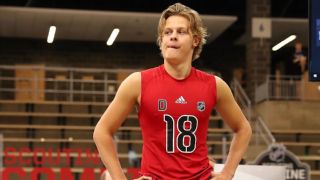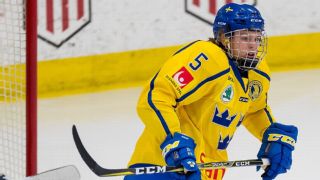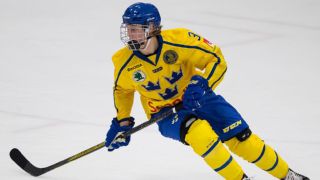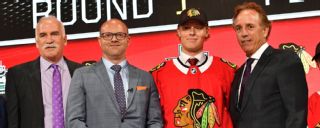|
Last year, during training for the International Ice Hockey Federation Under-18 World Championships, Sweden coach Torgny Bendelin had an idea. For a team-building exercise, his players would each reveal something about themselves. One by one, the teenagers shared details about their lives -- some intimate, some mundane. And then it was Adam Boqvist's turn. The swift-skating defenseman barely hesitated. "Well," Boqvist told the group. "I'm dyslexic." The cavalier attitude is nothing new for Boqvist, who was diagnosed with dyslexia when he was 10 years old. He embraces his learning disability as just one aspect of his life, something he says is "very normal" and "nothing to hide from." The International Dyslexia Foundation has published reports stating that between 15 to 20 percent of the population has dyslexia, a disorder that makes it difficult for people to match letters they see on a page and interpret them into words. That's up to one out of every five people that you meet. "A lot of people are dyslexic," Boqvist says. "Some guys might not open up about it because they are embarrassed, but I think it is good to talk about. You need to know that it's normal and it [does] not get [in the way] of achieving dreams."
 The Chicago Blackhawks selected the then-17-year-old Boqvist with the No. 8 pick of June's NHL draft, a bit of a surprise selection. Of course, the Blackhawks need restocking on defense -- Chicago has used all three of its first-round picks over the past two years on blueliners. But Boqvist, a sub-6-foot player who needs to add weight, will need a few seasons to adjust to the North American game, meaning he's more of a project. Chicago is trying to squeeze one last run out of its core that won three Stanley Cups in the past decade, though it appears management is retooling on the fly. Nonetheless, it's apparent why the Blackhawks' front office would hedge its bets on a player like Boqvist, who has a precocious sense of self. The teenager was a standout at Chicago's prospect camp in July, flexing some of his offensive prowess and nifty stickhandling, despite being the youngest participant. When asked about who he models his game after, Boqvist said, "I like to have the puck on a rush and make a move. I like to watch Erik Karlsson, but I try to play like Adam Boqvist." As for his confidence and openness when discussing dyslexia, it could be a key to future success. Consider Brent Sopel, a 12-year NHL veteran who was a defenseman on the Blackhawks' 2010 Stanley Cup team. Sopel also has dyslexia, though it went undiagnosed through his childhood and NHL career. That, Sopel says, led to issues with self esteem. "Back then, the recognition and diagnosis of dyslexia was completely different," Sopel, 41, told ESPN last year. "I struggled, every single day. I was a class clown and tried to make everyone laugh because then the focus wasn't on why I wasn't doing well at school. Reading, writing, everything was a struggle and nobody helped me. I couldn't wait for school to be over so I could grab my hockey stick and play, because that was the only thing I was good at." Sopel was diagnosed after his hockey career was over, and by then, other issues were compounded, including dependence on alcohol. Sopel is sober now and runs a foundation in Chicago that helps kids with dyslexia. This summer, the foundation has spent thousands of dollars to tutor students who were not diagnosed at an early age. "Finding out at an early age is huge, that's the whole key, that's why I have my foundation," Sopel says. "So for a kid like Boqvist who [was] 17 and, one, was diagnosed but, two, is comfortable talking about it -- that's everything. He's already on a great track."
 Boqvist, who turned 18 last week, grew up in Falun, Sweden, a small city in the center of the country that is best known for producing copper. He was very close with his brother, Jesper, who is 21 months older. (Jesper, a forward, was a 2017 second-round pick of the New Jersey Devils.) "Adam was always looking up to Jesper," their father, Patric, said in a phone interview from Sweden. "That was his biggest idol. Adam was always a little guy with a big smile." Since Patric coached in town, he had keys to the local rink, which he gave to his sons. Adam and Jesper would go home for dinner, then spend three, four or five hours at the rink at night. Luckily, there were many other players born in 1998 or 1999 in town to join in. Beginning at age 6, Adam played center. "But the team he was playing with was so bad," Patric explains. "So they had him [start playing] defense to stop the losses." By age 10, Boqvist was a full-fledged defenseman, and playing above his age group. "At 14, he was dominating the district," Patric says. "That's when we knew he could be something." Boqvist moved to a bigger club when he was 15, and by then, he was well on the radar of NHL scouts. School didn't come as easily. By fifth grade, Boqvist didn't just hate doing homework -- he detested it. Teachers noticed that he could answer questions if they were read to him aloud, but struggled when he had to process them himself on paper. Boqvist's mother is a resource room teacher, and she knew what these symptoms often meant. Boqvist was tested in sixth grade, and that's when the dyslexia diagnosis was revealed. Since it was detected early and the school system was equipped, Boqvist was given resources. Teachers gave him more time to complete assignments. He was given CDs to listen to, and computer programs that would help. Boqvist continued to work through his dyslexia, and is on schedule to graduate high school next year.
 There are new challenges, of course. Boqvist's family, agent and the Blackhawks came to a mutual agreement that it would be best if Boqvist plays in North America next season. "It will help me get to the NHL faster, I think," Boqvist says. He signed with the London Knights of the Ontario Hockey League, and was recently assigned a billet family. Boqvist will have a teacher visit twice per week; the family is hopeful the teacher will be conducive to his learning style. Boqvist is anxious to keep working on his English. He's self-conscious about his mastery of the second language so far (though he can fully hold a conversation) and knows full immersion in Canada will expedite the process. He has already made progress. "When he went to the combine before the draft, he was so nervous about his English," Patric says. "When he came home, he was so proud. Then the draft came and we listened to his [interviews in] English and he really has come a long way." The family already feels welcome in Chicago. Recently, assistant coach (and longtime NHL player) Ulf Samuelsson called Patric in Sweden to check in. The Boqvists say they will miss having their son nearby, but are excited to see how he flourishes with new challenges. "We are proud of him for hockey, and also how he [handles] the dyslexia," Patric says. "We are very happy he wants to talk about it. We think [it] makes it easier for him."
|


